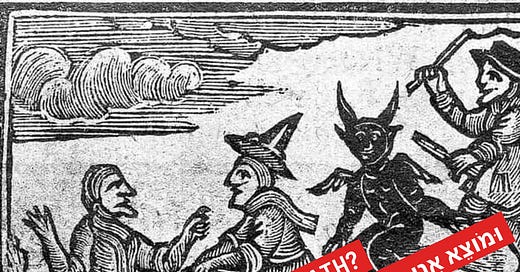Kohelet’s pearls of wisdom, found among more cynical and bitter gems of literary wisdom, include famous lines like the opening of this chapter: “A good reputation is better than the best oil.”
But this scroll, one of the most perplexing books of the Bible is also, at times, deeply unsettling - and misogynistic. A few famous verses in today’s chapter have caused many commentaries to try and excuse it and in more recent generations have given voice to many feminist scholars who call it for it is.
Following a series of sage suggestion to find equanimity in one’s life, to cultivate patience and not be quick to judge, the author points a blaming finger at females - all women are indicted as the source of what’s wrong in the world:
וּמֹוצֵא אֲנִי מָר מִמָּוֶת אֶת־הָאִשָּׁה אֲשֶׁר־הִיא מְצוֹדִים וַחֲרָמִים לִבָּהּ אֲסוּרִים יָדֶיהָ
טוֹב לִפְנֵי הָאֱלֹהִים יִמָּלֵט מִמֶּנָּה וְחוֹטֵא יִלָּכֵד בָּהּ. רְאֵה זֶה מָצָאתִי אָמְרָה קֹהֶלֶת אַחַת לְאַחַת לִמְצֹא חֶשְׁבּוֹן. אֲשֶׁר עֹוד בִּקְשָׁה נַפְשִׁי וְלֹא מָצָאתִי—אָדָם אֶחָד מֵאֶלֶף מָצָאתִי, וְאִשָּׁה בְכָל־אֵלֶּה לֹא מָצָאתִי.“I found woman more bitter than death; she is all snares, her heart a net, her hands are chains. He who pleases God escapes her, but the sinner is caught by her. Behold, I have found one man in a thousand, but a woman among them I have not found.”
Kohelet 7:26-28
It’s not difficult to read this and conclude that the author of Kohelet—whoever he was—harbored a deep resentment toward women. This is the stuff of old-school misogyny, the kind that would later be echoed in Western thought, sometimes with devastating consequences. Generations of readers, including the rabbinic literature of the Talmud tried to temper this or find some sort of creative way to minimize the harm, with little success.
This passage didn’t just stay within the confines of biblical commentary. It reappears centuries later in one of the most infamous texts of Christian misogyny: the 1487 Malleus Maleficarum or the Hammer of Witches - the handbook for identifying and persecuting supposed witches. The authors of this gruesome manual, German Catholic clergymen, leaned on Ecclesiastes 7:26 to justify their belief that women were the root of all temptation and sin, leading to the brutal witch hunts that saw tens of thousands of women tortured and executed across Europe.
How did a verse from Kohelet, a book known for its world-weary skepticism, become ammunition for such hatred?
Not all readers took this verse at face value. Medieval Jewish commentators, though certainly living in patriarchal societies, sought to soften or reinterpret its meaning.
Abraham Ibn Ezra, living in 12th century, Spain, offered this explanation:
“This does not refer to all women but to one particular woman—the one who entices men to sin. Similarly, when Scripture speaks of the ‘strange woman’ (Proverbs 7:5), it does not speak of all women but only of a woman who is corrupt in her ways.”
Ibn Ezra suggests that Kohelet is not condemning all women, just a certain kind—the kind that entraps men in wrongdoing. His approach is based on a much earlier attempt to locate this general attack on women as a literary metaphor. Midrash Kohelet Rabbah reinterprets “the woman” in 7:26 not as an actual woman but as a metaphor for heresy and idolatry—concepts that, in rabbinic literature, were often personified as a seductive but dangerous female figure.
Modern feminist scholars are less willing to let Kohelet off the hook. Judith Plaskow argues that verses like these are part of a broader biblical and rabbinic tradition that marginalizes and demonizes women. She emphasizes that regardless of whether the verse was intended metaphorically, it has been used to justify real-world harm. Rachel Adler takes this one step further, arguing that simply excusing or reinterpreting misogynistic texts is not enough. Instead, we must directly confront them and ask: what does it mean for a sacred text to carry such deeply problematic ideas? How do we reckon with these verses in a way that does not perpetuate harm?
Kohelet’s words about women are deeply unsettling, and no amount of allegory or reinterpretation fully erases their sting. They remind us that biblical texts are products of their time, reflecting ancient attitudes that—when left unchallenged—can continue to shape societies in dangerous ways.
But Kohelet is also a book about questioning. It is about facing the absurdities of life, the contradictions, the injustices. If we take Kohelet seriously, then we must ask: If this book is about wisdom, what kind of wisdom can we find in its most troubling verses?
Perhaps the lesson is this: patriarchal ideas, even when embedded in sacred texts, must be interrogated. Ecclesiastes 7:26 has been used to hurt women, to justify oppression, and to perpetuate fear. But it can also be challenged, reinterpreted, wrestled with, and ultimately, exposed for what it is: the voice of one man, written in a male-dominated context, in one moment of history, grappling with his own disappointments.
The question for us today is—how do we respond? Perhaps by pointing right back at the author and letting him and all the generations of scholars who agreed with him or let this line slide -- if anyone is more bitter than death - it’s those of you who hate women and all threaten your patriarchal power. We may not be there yet, Kohelet, but, with all due respect, time’s up.
Below the Bible Belt: 929 chapters, 42 months, daily reflections.
Become a free or paid subscriber and join Rabbi Amichai’s 3+ years interactive online quest to question, queer + re-read between the lines of the entire Hebrew Bible. Enjoy daily posts, weekly videos and monthly learning sessions. 2022-2025.
Become a Paid Subscriber? Thank you for your support!
#Ecclesiastes #Kohelet #fivescrolls #hebrewbible #כתובים #Ketuvim #Bible #Tanach #929 #קהלת# חמשמגילות #labshul #belowthebiblebelt929 #Kohelet7
#misogynistic #misogny #feministcritics #witchhunt #Malleus Maleficarum #textsofterror #racheladler #judithplaskow #time’sup!
#IbenEzra #patrirachy #fightback
#peace #prayforpeace #nomorewar



